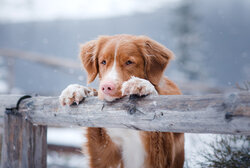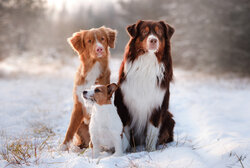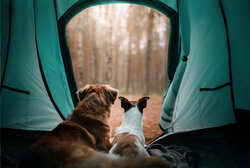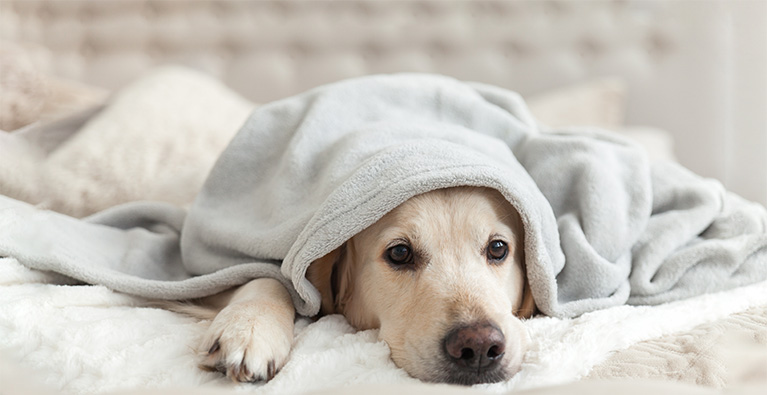New Year’s Eve with your dog – Starting the new year without anxiety
A lot of dogs are afraid of the loud noises on New Year's Eve. We have plenty of tips for an anxiety-free start to the new year.
Are all dogs afraid of New Year’s Eve?
Dogs can react in very different ways to the noise caused by loud fireworks. Professional hunting dogs, for example, are not bothered in the slightest; after all, they are trained to not react to gunfire. But many other dogs also show little concern. For some, however, the period around New Year’s Eve is the worst time of the year. They flinch at every bang, or hide away in the furthest corner of the room. If you have not yet spent a New Year’s Eve with your dog, you will, of course, wonder how your pet will react. And this is usually very difficult to predict. The chances of a stress-free New Year’s Eve are good if your dog is already used to loud noises, has not had any negative experiences as a puppy and is not generally timid. However, if your dog flinches when there is a loud noise, you should prepare it well for New Year’s Eve. It is important to understand how your dog feels, because in contrast to the sound of a door slamming shut, your pet is unable to associate the sound of a firework with anything.
Can I leave my dog alone on New Year’s Eve?
No one who has recently welcomed a puppy, a young dog or an adult dog into their home will know how their pet will react to the noises on New Year’s Eve. Your dog may well be relatively relaxed about the whole thing; however it may be frightened. It is therefore advisable to spend the first New Year’s Eve together with your pet. If everything goes well this year and your dog does not show any anxiety, then it may be able to stay home alone next New Year’s Eve if a few preparations are made. This should, however, always be decided individually.
Where can you celebrate a New Year’s Eve with your dog that is free of fireworks?
If you have a timid dog and you want to spend your New Year’s Eve without any bangs, then why not plan a trip to a firework-free zone? There are an increasing number of these throughout Europe. They can often be found, for example, in areas with a lot of thatched houses – simply because the fire risk is too high. Some islands have also been declared firework-free. National parks are another good choice because practically all countries have banned fireworks in these areas. The scenery is usually breathtaking and they are, of course, great for wonderful walks with your dog.
What can help a dog on New Year’s Eve?
To ensure that your dog is able to spend an anxiety-free New Year’s Eve, it is best to take a few precautions
- Close all your windows and darken the room – with blinds or shutters if you have them.
- Set up a place of retreat for your dog. Do, however, allow your pet to decide for itself where it prefers to be.
- Put on some calm, soothing music. Research has shown that classical music has a powerful relaxing effect.
- Have an extensive play session with your dog and provide some welcome distractions such as search and sniff games and tasty snacks.
What should I bear in mind when taking my dog for a walk?
Throughout the period when fireworks are sold, you and your dog can expect to hear frequent loud bangs. Some dogs are very scared and may run away in fright. It is therefore advisable to keep dogs on a lead at all times during this period.
How can I calm my dog down?
For some dogs, the sounds of New Year’s Eve are so unbearable that even quiet zones and distractions will not suffice. If you know that your dog will react in this way, a visit to the vet is advisable. Here your dog can be prescribed a suitable tranquilliser. You should, however, never self-medicate your dog.
You may also like this

Moving home with your dog
How to prepare your move with your dog

Dogs in winter
Ideal items, care and nutrition

Paw care for dogs
Protect your dog’s paws during the cold season

Holidays with your dog
How to prepare for a holiday with your dog

